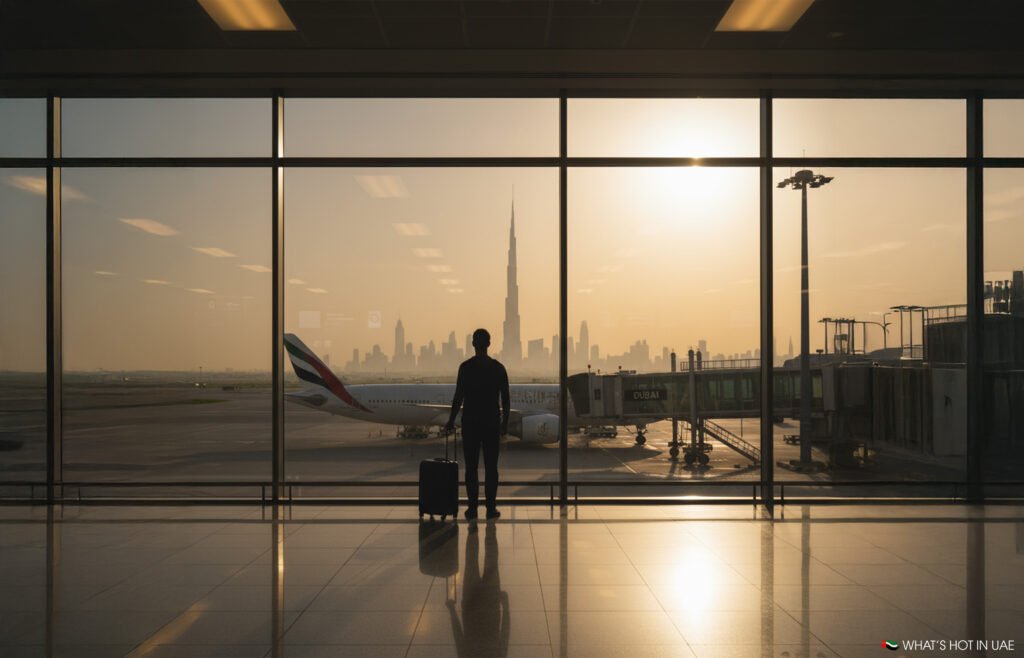The images are iconic: shimmering skyscrapers piercing a desert sky, luxurious shopping malls, and a lifestyle synonymous with ambition and opportunity. But behind the glamour of relocating to Dubai or Abu Dhabi lies a complex reality of paperwork, cultural nuances, and logistical hurdles. If you’re moving to the UAE, you’ve likely found yourself lost in a sea of fragmented blog posts, outdated forum threads, and overly promotional content, struggling to piece together a clear plan.
This is not another surface-level guide. This is your definitive, reality-based roadmap. We cut through the noise to provide a step-by-step framework that takes you from initial consideration to successfully thriving as an expat in the United Arab Emirates. We will tackle the real challenges head-on—from the bureaucratic maze of visas and document attestation to the true cost of living and the critical legal lines you can’t afford to cross.
This guide is structured in clear, actionable phases:
- The Reality Check: A balanced look at the pros and cons of UAE expat life.
- Phase 1: Your Pre-Move Blueprint (6-3 Months Out): Mastering documentation and financial prep.
- Phase 2: The Visa Maze, Demystified: A step-by-step guide to securing your residency.
- Phase 3: Budgeting for Reality: A data-driven breakdown of the true cost of living.
- Phase 4: Navigating Culture & Law: Your guide to a smooth social and legal landing.
- Phase 5: Your First 30 Days: A checklist for getting settled and operational.
- Thriving, Not Just Surviving: How to build a fulfilling life in your new home.
Let’s begin your journey to a prepared, confident, and successful move to the UAE.
For a complete practical guide to life in the Emirates, explore our full Living in the UAE hub.
The Reality Check: Is Moving to the UAE Right for You?
Before packing your bags, it’s crucial to weigh the incredible opportunities against the practical challenges of expat life in the UAE. This is a country of contrasts, and a clear-eyed assessment is the first step toward a successful relocation.
As one long-term expat from the UK shared, “The tax-free salary is a massive draw, and the safety here is unparalleled. But you have to be prepared for a different pace of life and a culture that demands respect. The first summer is a shock to the system, but you adapt.”
Here’s a balanced look at what to expect:
| Pros of Living in the UAE | Cons of Living in the UAE |
|---|---|
| Tax-Free Income: The most significant financial benefit for many expats. | High Cost of Living: Rent, international schooling, and leisure can be very expensive. |
| High Level of Safety: Exceptionally low crime rates make it a secure place for individuals and families. | Extreme Climate: Summer temperatures regularly exceed 45°C and can surpass 50°C (122°F), limiting outdoor activity. |
| Multicultural Environment: With a population of nearly 90% expats, you’ll meet people from all over the world. | Transient Community: It can be difficult to form deep, long-term friendships as many expats stay for only a few years. |
| World-Class Infrastructure: Modern housing, excellent roads, clean public transport, and top-tier amenities. | Complex Bureaucracy: Visa processes, document attestation, and administrative tasks can be slow and confusing. |
| Travel Hub: The UAE’s central location makes it an ideal base for exploring the Middle East, Asia, Europe, and Africa. | Strict Laws & Cultural Norms: A lack of awareness can lead to serious legal consequences. |
Ultimately, the UAE offers an incredible lifestyle for those who are well-prepared, adaptable, and respectful of the local culture. For a high-level government overview of the process, a great place to start is the Official UAE Government Relocation Portal.
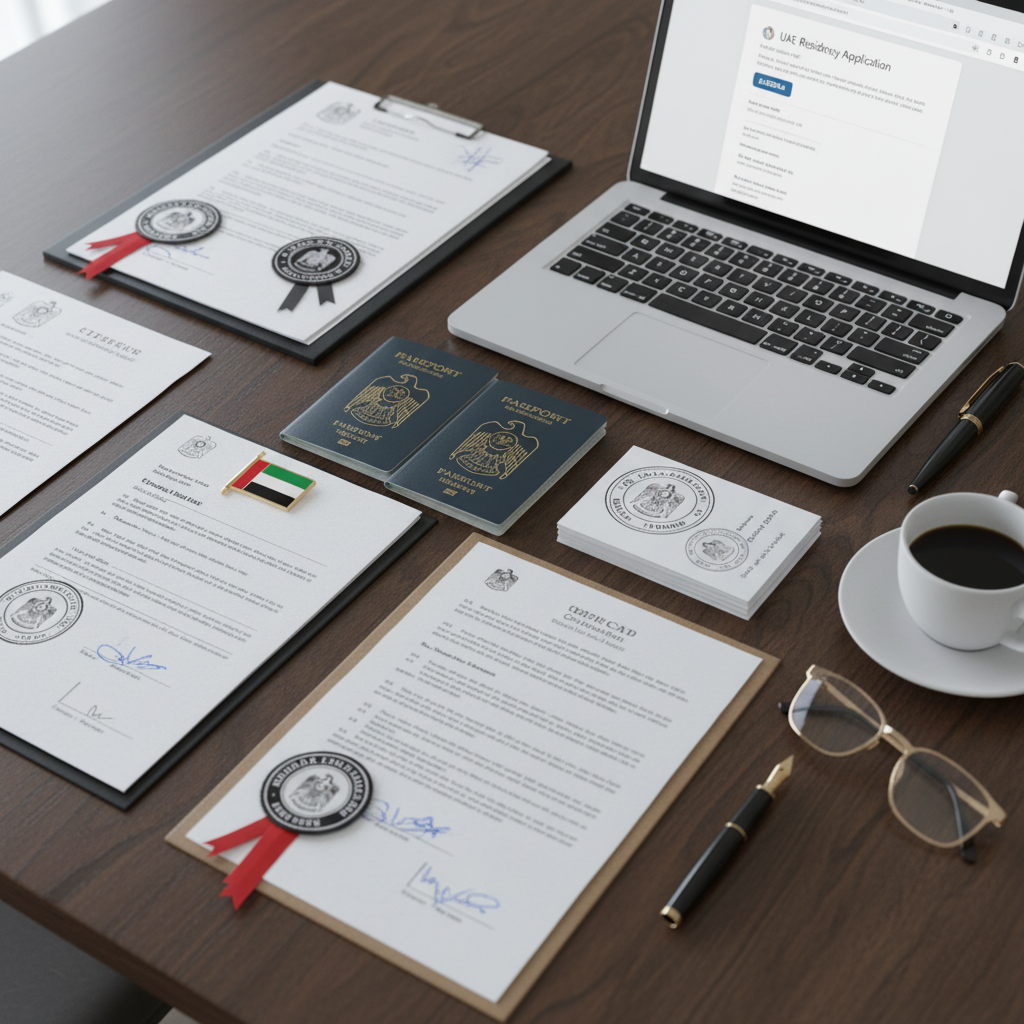
Phase 1: Your Pre-Move Blueprint (6-3 Months Out)
A successful move is built on a foundation of meticulous planning. The period six to three months before your departure is about tackling the two biggest hurdles: documentation and finances. Procrastination here can cause significant delays and stress later on.
To help you stay organized, we’ve created the Ultimate UAE Relocation Checklist, which you can download and use to track your progress. This guide will walk you through the most critical items on that list.
Expert Tip: “The single biggest delay we see for new expats is underestimating the document attestation process,” notes a leading relocation consultant. “It’s not just getting a stamp; it’s a multi-step process involving government departments in your home country and the UAE embassy. Start this process at least three months before your move, if not earlier.”
The Critical First Step: Document Attestation Explained
What is document attestation? It’s the process of certifying your official documents so they are legally recognized in the UAE. Without attested documents, you cannot get a residence visa, sponsor your family, or enroll your children in school.
Common documents that require attestation:
- University Degrees / Educational Certificates
- Marriage Certificates
- Birth Certificates (for children)
- Professional Qualifications or Trade Certificates
The process can be complex, but it generally follows these steps:
The Document Attestation Journey: From Your Home Country to the UAE
- Home Country Certification: Your document is first certified by a relevant authority in your home country (e.g., a solicitor or notary public).
- Government Verification: It is then sent to your country’s foreign affairs department (e.g., the U.S. Department of State) for an apostille or further authentication.
- UAE Embassy Legalization: The document is then legalized by the UAE Embassy or Consulate in your home country.
- Final UAE Attestation: Upon arrival in the UAE, the document receives its final attestation from the Ministry of Foreign Affairs (MoFA).
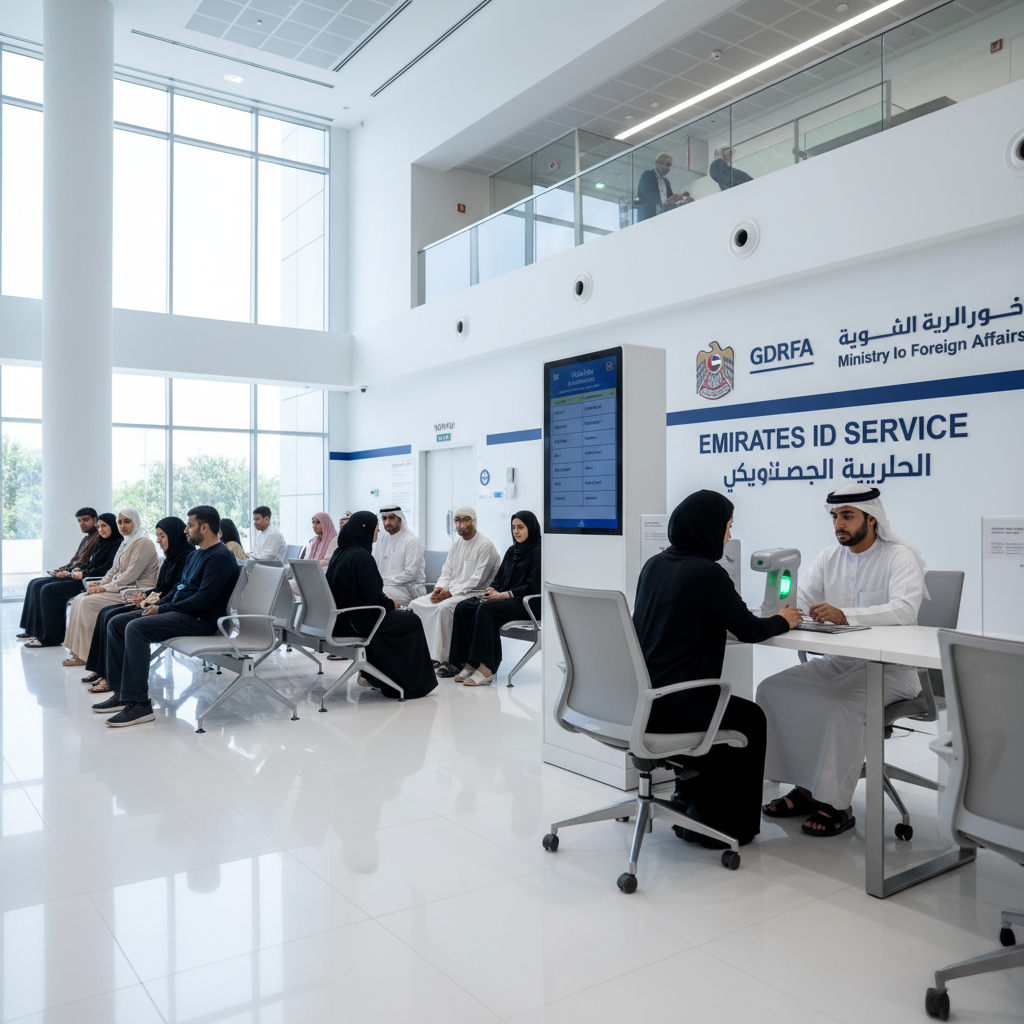
Each country has specific requirements. For example, those moving from the United States should consult the official guidelines from the UAE Embassy in Washington, DC, for the most accurate information.
Initial Financial Planning & Savings Goals
Moving to the UAE is a significant financial undertaking. You will need a substantial buffer to cover costs before your first salary arrives. A common mistake is underestimating these initial setup expenses.
Aim to have at least 1-2 months of your estimated living expenses saved, in addition to the specific relocation costs.
Sample Relocation Budget:
| Expense Category | Estimated Cost (for a single person) | Notes |
|---|---|---|
| Flights | $500 – $1,500 | One-way, depending on origin and class. |
| International Shipping | $1,000 – $5,000+ | Depends on volume (air vs. sea freight). |
| Visa & Emirates ID Fees | $800 – $1,200 | Includes medical test, application fees. Often covered by employer. |
| Initial Accommodation | $1,000 – $2,500 | For a hotel or serviced apartment for the first 2-4 weeks. |
| Rental Deposit & Agency Fee | $2,000 – $5,000+ | Typically 5% of annual rent for deposit + 5% for agency fee. |
| Living Expense Buffer | $4,000 – $6,000 | Covers food, transport, and utilities for 1-2 months. |
| Total Estimated Savings | $9,300 – $21,200+ |
Financial institutions like HSBC Expat strongly recommend notifying your home country banks of your international move to avoid having your accounts frozen due to unusual activity.
Phase 2: The Visa Maze, Demystified
The UAE residence visa is your key to living, working, and fully functioning in the country. While the process can seem intimidating, it’s a well-trodden path. The primary, authoritative source for all visa regulations is the official government portal[1].
For anyone relocating, understanding these key terms is essential:
- GDRFA (General Directorate of Residency and Foreigners Affairs): The government body responsible for issuing visas and entry permits, with a major office in Dubai.
- Entry Permit (or “Pink Visa”): A temporary visa that allows you to enter the UAE for the purpose of employment. Your employer typically arranges this before you travel. It is valid for 60 days, during which you must complete the residency formalities.
- Medical Fitness Test: A mandatory health screening for all residence visa applicants aged 18 and over, testing for specific communicable diseases.
- Emirates ID: The UAE’s mandatory national identity card for all residents. You cannot open a bank account, sign a rental lease, or get a mobile phone plan without it.
For direct access to official information, visit the UAE Government Visa and Residency Information portal or, for Dubai-specific services, the Dubai General Directorate of Residency and Foreigners Affairs (GDRFA).
The Employment Visa Process: A Visual Flowchart
- Job Offer & Contract Signed: You accept a formal job offer from a UAE-based company.
- Employer Applies for Entry Permit: Your employer (your “sponsor”) submits the necessary paperwork to obtain your entry permit.
- Enter the UAE: You travel to the UAE using the entry permit.
- In-Country Formalities (within 60 days):
- Complete the mandatory Medical Fitness Test.
- Visit a service center for Emirates ID biometrics (fingerprinting and photo).
- Visa Stamping: Your employer submits your passport, medical results, and other documents to have the residence visa sticker placed in your passport.
- Emirates ID Issued: Your official Emirates ID card is printed and delivered. The process is complete.

Path 1: Employment Residence Visa (The Most Common Route)
For most expats, the residence visa is tied to their employment. Your employer acts as your sponsor and handles the majority of the application process. However, you will be responsible for providing the required documents, which typically include:
- Passport with at least 6 months validity and multiple blank pages.
- Passport-sized photos with a white background.
- The original Entry Permit.
- Your attested educational certificates (as required for your profession).
- A signed offer letter or employment contract.
Once you enter the UAE, you must complete the in-country medical test and Emirates ID biometrics. The medical test is a straightforward process involving a blood test and a chest X-ray. The results are usually available within 24-48 hours.
Path 2: Sponsoring Your Family
Once your own residence visa is stamped, you can sponsor your spouse and children to live with you in the UAE. To do this, you must meet a minimum salary requirement. According to the official UAE government portal, this is typically a salary of at least AED 4,000 per month, or AED 3,000 per month if your employer provides accommodation[1].
You will need to provide attested documents proving your relationship, such as an attested marriage certificate (for your spouse) and attested birth certificates (for your children).
Understanding Visa Costs and Renewal
While your employer often covers the cost of your own employment visa, you will typically pay for your family’s visas. It’s crucial to budget for these expenses.
Estimated Visa Process Costs (per person):
| Item | Estimated Cost (AED) |
|---|---|
| Entry Permit & Application Fees | 1,000 – 1,500 |
| Medical Fitness Test (Standard) | 300 – 400 |
| Emirates ID Application (2-year visa) | 270 |
| Visa Stamping | 500 – 700 |
| Total Estimated Cost | 2,070 – 2,870 |
Residence visas are typically valid for two years and must be renewed before they expire. The renewal process is simpler than the initial application and involves another medical fitness test.
Common Mistakes to Avoid:
- Letting your passport expire: Ensure your passport has well over 6 months of validity before starting the process.
- Ignoring attestation: Assuming a document from your home country will be accepted without the proper chain of attestations.
- Missing the 60-day window: Failing to complete the in-country formalities within 60 days of arrival will result in fines.
Phase 3: Budgeting for Reality: The True Cost of Living in the UAE
The promise of a tax-free salary is a powerful lure, but it’s essential to understand the real cost of living in the UAE to budget effectively. While some costs are lower, others, particularly housing and education, can be substantial.
According to data from Numbeo, the global cost-of-living database, Dubai is considered 45% less expensive than New York City overall, but this varies greatly depending on your lifestyle.
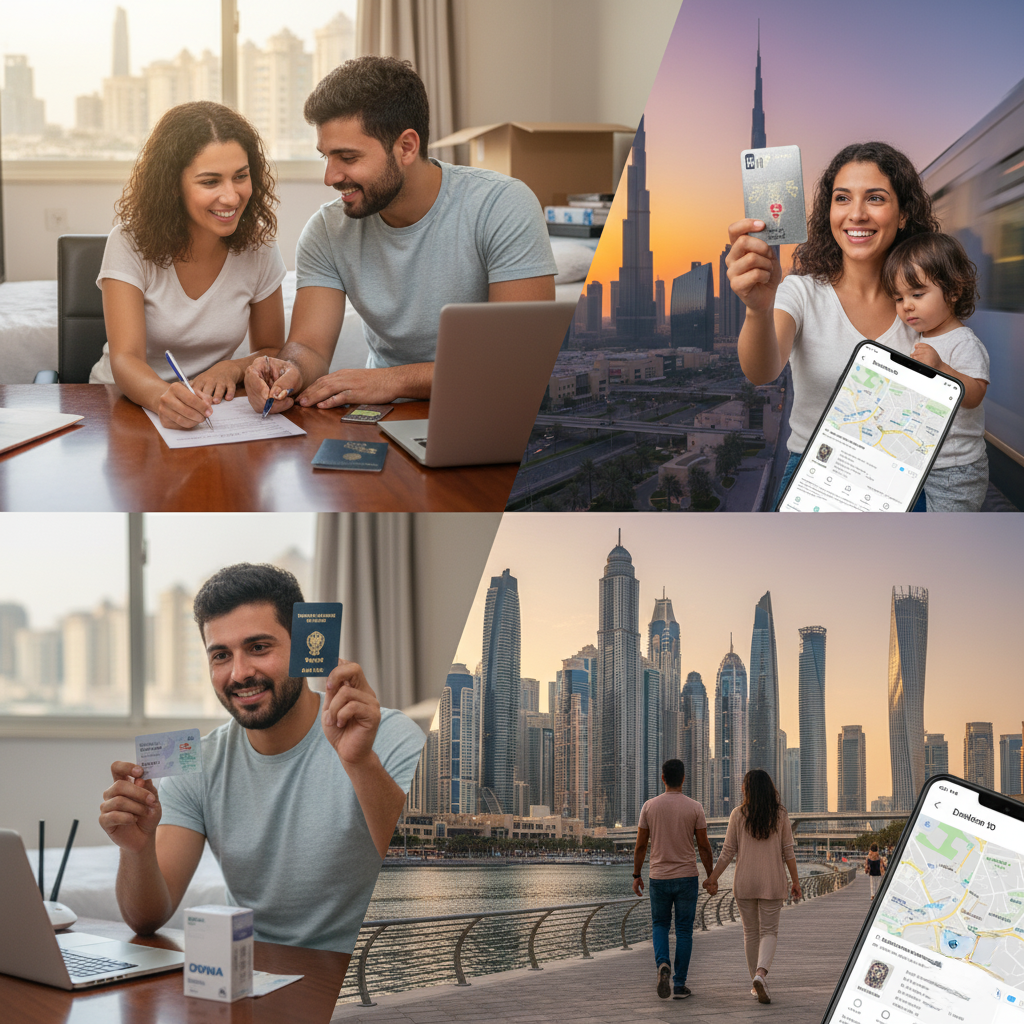
Detailed Monthly Cost of Living Breakdown (Dubai, Mid-Range Lifestyle):
| Category | Single Person (AED) | Family of Four (AED) | Notes |
|---|---|---|---|
| Housing | 4,500 – 7,500 | 8,000 – 15,000 | 1-bed vs. 3-bed apt in popular expat area. |
| Utilities (DEWA, Internet) | 800 – 1,200 | 1,500 – 2,500 | Higher in summer due to A/C. |
| Groceries | 1,000 – 1,500 | 2,500 – 4,000 | Varies based on local vs. imported goods. |
| Transportation | 500 – 1,500 | 1,500 – 3,000 | Public transport vs. owning a car. |
| International Schooling | N/A | 4,000 – 10,000+ | Per child, per month. A major expense. |
| Healthcare Insurance | 300 – 600 | 1,200 – 2,500 | Often partially or fully covered by employer. |
| Entertainment & Dining | 1,000 – 2,000 | 2,000 – 4,000 | Dining out, cinema, leisure activities. |
| Total Monthly Estimate | 8,100 – 14,300 | 20,700 – 41,000 | |
| USD Equivalent | $2,200 – $3,900 | $5,600 – $11,160 |
Housing: Your Biggest Expense
Rent will be your largest monthly outlay. Popular expat neighborhoods like Dubai Marina, Jumeirah Lakes Towers (JLT), and Arabian Ranches offer different lifestyles at varying price points. For example, rental prices for a one-bedroom apartment in JLT can range from AED 70,000 (USD 19,059) to AED 90,000 (USD 24,504) annually.
A unique aspect of the Dubai rental market is the tradition of paying rent in one, two, or four post-dated cheques for the entire year. While monthly payments are becoming more common, you should be financially prepared for a large upfront payment.
The ‘Hidden’ Costs: Schooling, Healthcare, and Utilities
Three major costs often surprise newcomers:
- International Schooling: If you have children, this will be a massive part of your budget. Fees for reputable international schools can range from AED 30,000 to over AED 100,000 per child, per year.
- Healthcare: There is no public healthcare provision for expats in the UAE. Private health insurance is mandatory for all residents. While most employers provide a basic plan, many expats choose to upgrade their coverage, especially for family plans.
- Utilities: The cost of electricity and water (known as DEWA in Dubai) can be high, especially during the scorching summer months when air conditioning runs constantly.
Phase 4: Navigating Culture & Law: Your Guide to a Smooth Landing
Adapting to the local culture and understanding the legal framework is not just polite—it’s essential for your safety and well-being. The UAE is a tolerant and welcoming country, but it operates on a foundation of Islamic tradition and a strict legal code.
The UK Government’s Foreign, Commonwealth & Development Office (FCDO) provides clear guidance, warning that “UAE laws and customs are very different to those in the UK… Public displays of affection are frowned upon, and sexual relationships outside of marriage are illegal”[2].
A lack of awareness can have severe consequences. For instance, swearing in a WhatsApp message can be penalized by a fine up to AED 250,000 and imprisonment, with deportation for expats.
Cultural Do’s and Don’ts:
| Do | Don’t |
|---|---|
| Dress modestly in public places like malls and government buildings. Cover shoulders and knees. | Engage in public displays of affection, such as kissing or hugging. Holding hands is generally acceptable. |
| Use your right hand to eat, shake hands, or pass objects, as the left hand is considered unclean. | Swear or use offensive language or gestures in public or online. This is a criminal offense. |
| Accept coffee or dates when offered as a sign of hospitality. | Photograph people without their permission, especially women. |
| Be respectful during Ramadan. If you are not fasting, eat, drink, and smoke only in designated private areas during fasting hours. | Consume alcohol in public places or be visibly intoxicated. Alcohol is restricted to licensed venues and private homes. |
Understanding Key Legal Differences
The UAE legal system is based on civil law principles with influences from Islamic Sharia law. Recent legal reforms have modernized some regulations, such as decriminalizing the cohabitation of unmarried couples and easing restrictions on alcohol consumption for non-Muslims (who must still obtain a license in some Emirates). However, the core principles remain conservative compared to Western countries. It is crucial to stay informed and act with caution.

Workplace Culture: Adapting for Professional Success
The UAE workplace is a unique melting pot of cultures. Hierarchies are often more formal than in the West, and decisions are typically made at the top. Building personal relationships is key. The concept of ‘wasta’—using one’s connections and influence to get things done—is a real factor in business.
“In the West, you build a business relationship, and it might lead to a personal one. Here, it’s often the other way around,” explains an HR consultant with 15 years of experience in Dubai. “Take the time to have coffee, ask about family, and build trust. That personal connection is what opens doors.” Patience, politeness, and an indirect communication style are highly valued.
Phase 5: Your First 30 Days: A Checklist for Settling In
Your first month will be a whirlwind of administrative tasks. Tackling them systematically will make the process much smoother. For those moving to the capital, the Abu Dhabi Government Services Portal (TAMM) is an invaluable resource.
Week 1 Tasks:
- Complete your medical fitness test. This is your top priority.
- Apply for your Emirates ID at a service center (biometrics appointment).
- Get a local SIM card. You’ll need a local number for everything.
- Begin your apartment search.
Week 2-4 Tasks:
- Open a local bank account.
- Sign your rental lease and register it (e.g., Ejari in Dubai).
- Set up your utilities (DEWA for water/electricity, and Du/Etisalat for internet/TV).
- Obtain a local driving license or have your international one validated.
Getting Official: Your Emirates ID and Medical Test
As mentioned in the visa section, these are the first and most critical steps upon arrival. For your appointments, dress modestly and ensure you bring all required documents, including your passport, entry permit, and passport photos. The process is efficient but can be crowded, so go early.
Opening a Bank Account: A Step-by-Step Guide
You cannot fully function financially without a local bank account. While some digital banks allow you to open a non-resident account before you arrive, you will need your Emirates ID to open a full-service resident account with a chequebook and credit facilities.
Top Banks for Expats in the UAE:
| Bank | Key Features for Expats | Minimum Balance (Typical) | Mobile App Quality |
|---|---|---|---|
| Emirates NBD | Largest bank, extensive ATM network, feature-rich app. | AED 3,000 | Excellent |
| First Abu Dhabi Bank (FAB) | Strong international presence, good mortgage and loan products. | AED 3,000 – 5,000 | Very Good |
| Abu Dhabi Commercial Bank (ADCB) | Excellent customer service, popular for TouchPoints rewards program. | AED 5,000 | Very Good |
Finding a Home and Getting Connected
Finding an apartment involves browsing property portals, engaging a real estate agent, and viewing properties. Once you choose a place, you’ll sign a tenancy contract.
“Read your rental contract carefully,” advises a Dubai-based real estate agent. “Pay close attention to the maintenance clauses and any restrictions on making alterations. In Dubai, your contract must be registered with Ejari, the official online registration system, to be legally valid and to set up your utilities.”
Once your Ejari is registered, you can apply for your DEWA (Dubai Electricity and Water Authority) connection online. Similarly, you can set up your home internet and mobile plans with providers like Du or Etisalat.
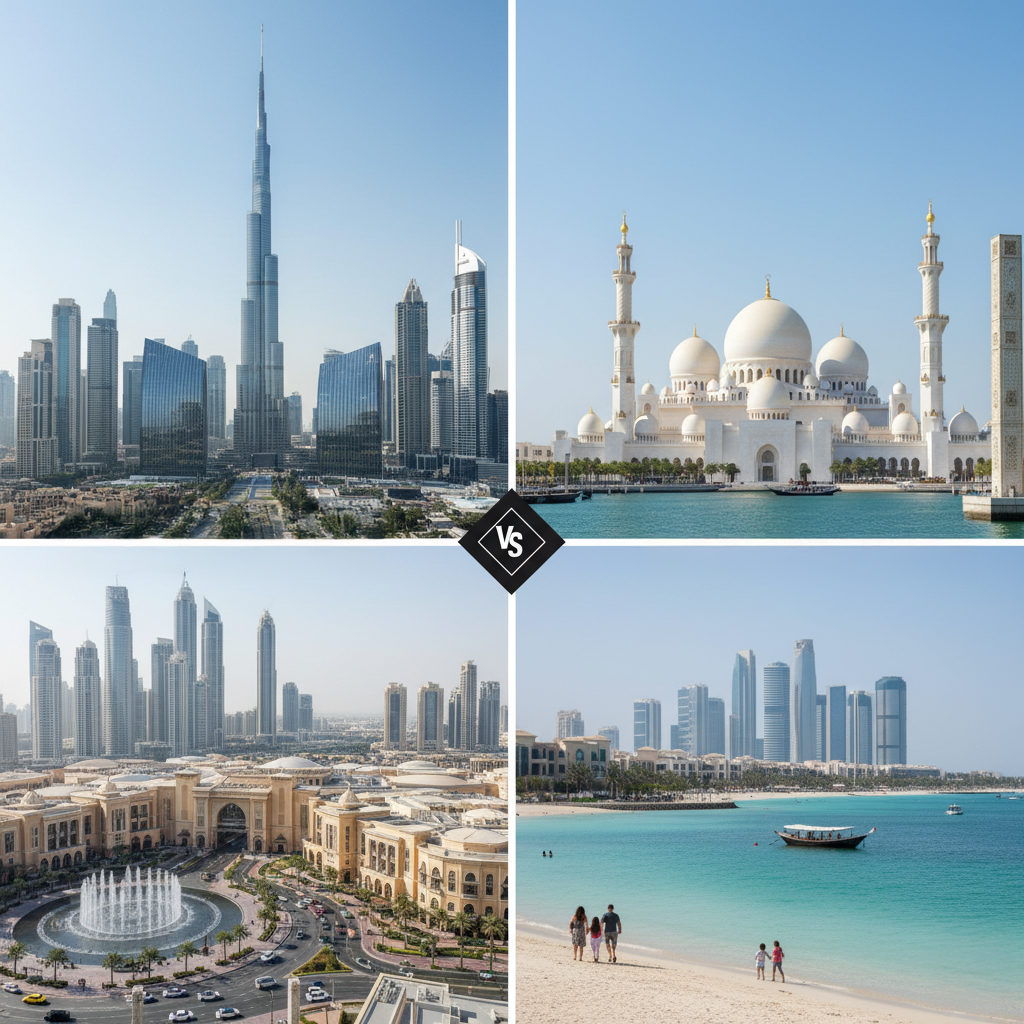
Thriving, Not Just Surviving: Building Your Expat Life
Once the administrative hurdles are cleared, the real journey begins: building a life. The transient nature of the expat community can make it feel challenging to connect, but the key is to be proactive.
Join expat groups on social media, sign up for a sports league (from cricket to dragon boating), take a class, or get involved with professional networking organizations. Stepping outside the “expat bubble” and engaging with the diverse cultures around you will enrich your experience immeasurably.
For getting around, Dubai has an excellent and affordable public transport system, including the Dubai Metro, tram, and buses. While many expats choose to own a car for convenience, especially for families living in suburban villa communities, it’s entirely possible to live a full life relying on public transport and the readily available taxis and ride-sharing services.
Final Word
Moving to the UAE is more than just a change of address; it’s a leap into a dynamic, fast-paced, and culturally rich new world. The journey can be demanding, filled with paperwork and adjustments, but the rewards—from financial growth and career opportunities to unparalleled safety and a truly global lifestyle—can be immense.
As this roadmap has shown, the key to a successful relocation lies in preparation and a realistic understanding of the challenges. By methodically navigating the phases of planning, securing your visa, budgeting for reality, and embracing the local culture, you transform a daunting process into a manageable and exciting adventure. You arrive not just with your luggage, but with the confidence and knowledge to build a thriving life in your new home.
Feeling prepared? Download our comprehensive UAE Relocation Checklist to start tracking your journey. Share your own moving tips or questions in the comments below!
This article provides informational guidance and does not constitute legal or financial advice. Visa, legal, and financial regulations are subject to change. Please consult with a qualified immigration lawyer or financial advisor for your specific situation.
References & Authoritative Sources
- The Official Portal of the UAE Government. (n.d.). Residence visas. Retrieved from https://u.ae/en/information-and-services/visa-and-emirates-id/residence-visas
- Foreign, Commonwealth & Development Office, UK Government. (n.d.). Foreign travel advice: United Arab Emirates. Retrieved from https://www.gov.uk/foreign-travel-advice/united-arab-emirates/safety-and-security



